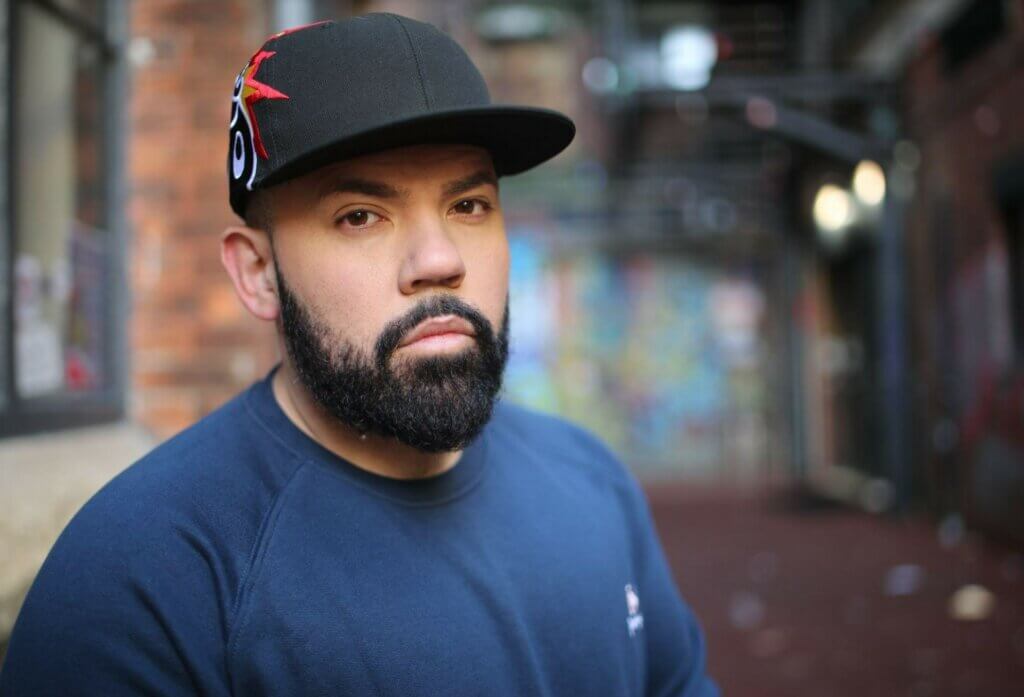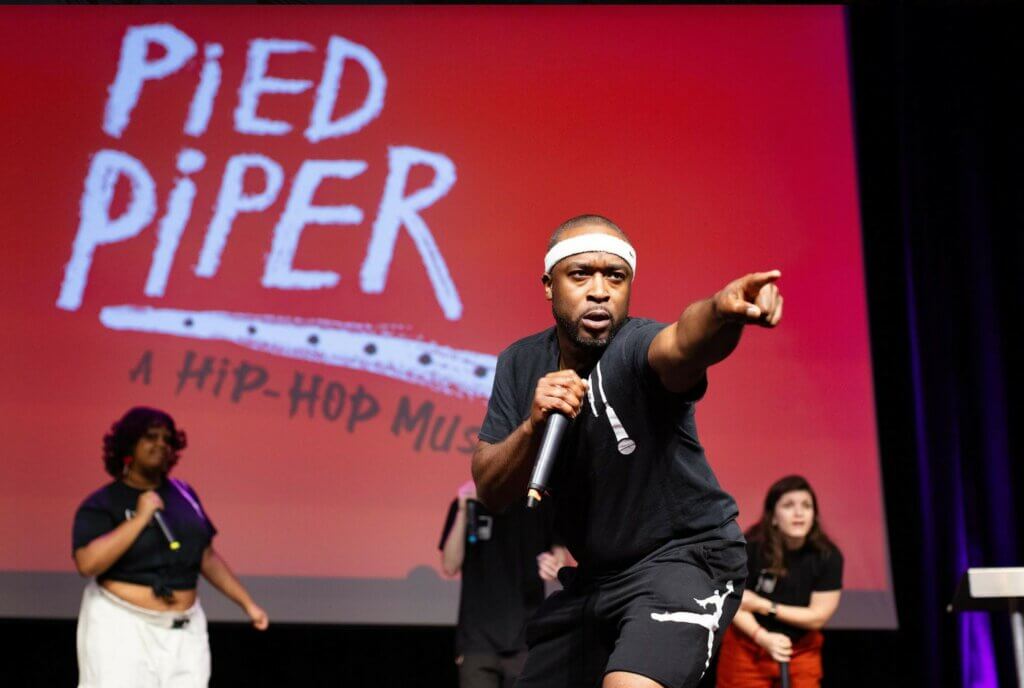
Meet Conrad Murray, the visionary creator of “Pied Piper,” which will be showcased at Battersea Arts Centre from October 24th — 28th. We delve into the inspiration behind this innovative hip hop musical based on the medieval fairy-tale. He shares insights into the unique creative process that involves beatboxers and musicians in the cast, distinguishing “Pied Piper” from his previous work, “Frankenstein: How to Make a Monster.” We explore the thought-provoking themes addressed in the play and the electrifying experience it promises to offer the audience. Murray’s commitment to involving the local community and his personal vision for the production add depth to our conversation. As we anticipate the world première of “Pied Piper,” Murray reflects on the influence of exceptional reviews, the significance of support from foundations and individuals, and the powerful messages and emotions he hopes the audience will take away from this remarkable theatrical journey.
What inspired you to create “Pied Piper,” a hip hop musical based on the medieval fairy-tale?
The story of the Pied Piper was music based, and talks about the threat of the artist, and how they can challenge society. It felt like a great fit for a hip hop show! Plus, it seemed suitable for a family show.
Can you tell us about the creative process behind the production, especially with the involvement of beatboxers and musicians in the cast?
Me and the producer of Frankenstein, Lara Taylor, wanted to come up with a new idea and challenge ourselves to improve on what we have done before. So we started to develop the story and do workshops along with Lakeisha Lynch Stevens with young people to test stuff out.
I wanted to put together a fantastic cast of talents and characters. Some were already in the Academy, and others have been developed through the Academy. In this way, we have created a super team who jam and write together. It’s been a few years now, so people have grown up and developed.
We worked as a team to explore the themes and musical ideas through workshops and jams. Everyone was beatboxing, jamming , rapping and singing. After a few weeks working together, I collated the material and started to create a script with the music and ideas that we explored.
How does “Pied Piper” differ from your previous work, “Frankenstein: How to Make a Monster,” in terms of theme and style?
Frankenstein was episodic, each scene told its own story and created a mood and aesthetic. We used themes from the original Mary Shelley book to create our own response. It was like a live theatrical album in a way.
With Pied Piper, we aimed to tell a narrative story where all the scenes linked to tell a story, one that could be communicated to families of all ages. It is a different show, and in many ways a lot more ambitious.
I teamed up with Ria Parry who I have worked with before on a hip hop theatre solo show DenMarked, to help deliver this vision of amazing music and visual but also a strong story. In Frankenstein, it was pretty much myself and the cast creating the whole aesthetic journey of the piece.
Tell us about the issues the play addresses? How did you come up with the idea of intertwining these elements with the classic Pied Piper story?
We wanted to address greed, capitalism , the power of art and challenging of established ideas. These were the ideas that we found were in the original version, and that we were passionate about exploring today, in our work.
The world is changing fast, and people need to feel empowered to give their energy and ideas to take the lead and embrace change.
There is a theme within the Pied Piper, which we pushed a lot more, that says that young people have power. After all, in the story, the Piper eventually inflicts his utmost revenge by taking the most prized possession — the children.
What kind of experience can the audience expect from “Pied Piper”? How does it stand out as a unique and electrifying night of vocal wizardry?
The show features amazing MC’s, R&B vocals and incredible beatboxing from some of the best beatboxers in the world. It’s going to feel somewhere between a gig, a musical and an open mic night at the same time. Every single note and sound you hear will be from the human voice.

photo credit — Nathan Eaton-Baudains
We see that the local community also has special guest performances. How important was it for you to involve the community in the production, and what impact did it have on the play?
As our team is the Beatbox Academy it would feel redundant to create a performance that just shows off the best talents that we have in the company. We wanted to show off the Beatbox Academy as a whole. The talents are varied, and everyone has interesting sounds and performances to give within the Academy- and around the country. So we will use our platform to highlight other performers and artists wherever the show goes. .
As the writer, composer, and musically directed, can you tell us about your personal vision and objectives for “Pied Piper” and how it translates into the final performance?
I know that the BAC Beatbox Academy can create amazing sounds and mind-blowing music. Over 15 years we have developed a process and system to help develop and create the most weird and wonderful experimental sounds. We do that week in, week out.
With Piper, we wanted to create something where we could develop and show off other aspects — dance, story, characters. This meant that I had to make sure that the script and story allows for these things to happen. The overall show, and the objectives of the show- and the development of the performers and the academy are just as important to me.
The community aspect has been really pushed and experimented with in this show, in a way that is far more ambitious. We have integrated the community chorus within part of the story and are working with them before the show, on themes and ideas to integrate into the show.
“Frankenstein: How to Make a Monster” received exceptional reviews. Does this add any pressure or excitement as you approach the world première of “Pied Piper”?
In a way it does — because there will be expectations. But I know that I just have to explore and create the show I want to create, and reviewers will say what they have to say, but the 4/5‑year process creating this has already been fruitful and we have been able to learn from.
You can’t control what other people say about your work — you just have to feel it and do what you want to do and say what you want to say.
The play is supported by various foundations and individuals. How has this support influenced the development and scope of “Pied Piper”?
The support is everything. Battersea Arts Centre is a playground for artists, and although things can get difficult within the current climate (funding cuts), the fact that we are able to exist is a miracle. The organizations – including Arcade, Gulbenkian and individuals are allowing a group of exciting performers and artists a chance to progress and put a perspective out there in the world, and that is pretty special.
Finally, what message or emotions do you hope the audience will take away from “Pied Piper,” and what impact do you anticipate it having on the community and society as a whole?
Firstly, I want everyone to have a great time and enjoy the beats and vibes.
Throughout the performance, I hope that the audience thinks about challenging the establishment and how powerful our voices really can be, especially when we work together.
I hope that by watching us, people are inspired to be creative, and can see the performers onstage — Black, White, Asian , young, working class and super talented and see themselves.
I also hope that they are interested enough to my previous book, the first book on hip hop theatre – Making hip hop theatre (with Katie Beswick) , which documents my process and gives ideas on how to create yourselves, and also the script of the Pied Piper both published by Methuen Drama.
‘Pied Piper’ will debut at the Battersea Arts Centre 24th- 28th October.
Tickets available HERE
